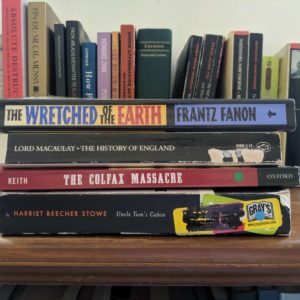Choosing a topic for independent work can be a challenging task. It can be difficult to narrow down the seemingly infinite research topics to one that you find compelling (see my post here with tips on how to do that), and on top of that, you have to juggle your research with coursework that may be unrelated. It isn’t always easy to switch gears between, say, literary criticism and your STL. That said, your coursework need not be totally separate from your independent work, and need not even parallel your independent work at the exact time you are conducting it. With courses for the spring semester just released, I want to suggest ways that you can structure your selections to complement (and even supplement!) your own research. This way, next semester, your own independent work may not actually be so “independent” after all.
The summer before my sophomore year, I conducted a historical research project focusing on New York City press reporting on a June 1848 Paris workers’ rebellion with the ReMatch+ program (I’ve mentioned this work in posts here and here). By the end of the summer, I knew I wanted to continue this research into the school year, so I declared early as a history concentrator to write my first JP on the topic in my sophomore spring. While this did not exactly go as planned (I ended up writing my first JP on a completely different topic), I chose courses that could help me answer the historical questions I was asking over the summer. This way, I felt my research continued, though I was not formally engaged in it. Most importantly now, taking courses this way set me up well to pursue my a modified version of my ReMatch topic as my second JP this semester (see here on how my research trajectory has since changed).
Through my sophomore year, some of my courses were immediately related to my research topic— namely Professor Matthew Karp’s course on the American Civil War era, and Professor Tera Hunter’s course on African American history to 1863. The readings and discussions in these courses filled in many of the gaps I felt were left in my research once the summer ended, and it was good to have fresh perspectives on the time period I was studying. And, being that they covered a much wider breadth of material than my research (admittedly not a high bar when your topic focuses on a single month in a single year), they provided me with some much needed context I partially missed in my ultra-focused summer reading.

In addition to these more obviously relevant courses, I also pursued coursework that gave me a more precise theoretical frame for my work. For the most part, these were outside of my home department. Notably, Professor Claudia Brodsky’s Epistemologies of the Polis and Professor Adam Potkay’s Hope: A History helped me to probe the political, even the existential questions of my research: How would Americans and French in 1848 have understood their relationship to government? What informed the workers’ aspirations, and how did they articulate these aspirations in the pursuit of reform? Moreover, not only did these courses inform my research, but also, my research informed my approach to these courses. In a sea of dense theoretical texts, having a research question in mind helped me find my way.
I would suggest this two-pronged approach— a combination of immediately relevant and theoretically framing courses— to students who, like I did, have summer work they would like to pursue during the semester, or have a research question that they think they would like to focus on in their upcoming independent work. Even if this is not the case for you, it can be helpful to think of a sort of central question you want to inform your Princeton career. Having a curriculum of sorts can make the free-for-all of course selection a bit more manageable, especially if you discuss with your professors or academic advisor to flesh it out.
Of course, some will prefer to branch out more in their coursework than stick to a driving question (such is the beauty of liberal arts education). And, it’s completely fine to be unsure of your independent work topic before junior year. If this is where you are, you might find these PCUR posts from Shannon and Raya helpful. But even then, I think the complementary coursework method I described is still usable. It can be hard to jump between coursework and research if the two are very different, as I said, so it may be a good idea to pick courses that support and inspire your independent work as you complete it— and again, from both an immediate and more theoretical perspective. I’m trying to do this now, with Professor Lee Mitchell’s course on mid-19th century American literature and Professor Jacob Shapiro’s course on violent politics, respectively.
With these courses to back me up now, and a year’s worth of other relevant coursework behind me, I feel quite ready to tackle my second JP. I’m looking forward to continuing this research in which I’ve become so invested, and now from a more informed place than when I began.
–Alec Israeli, Humanities Correspondent

